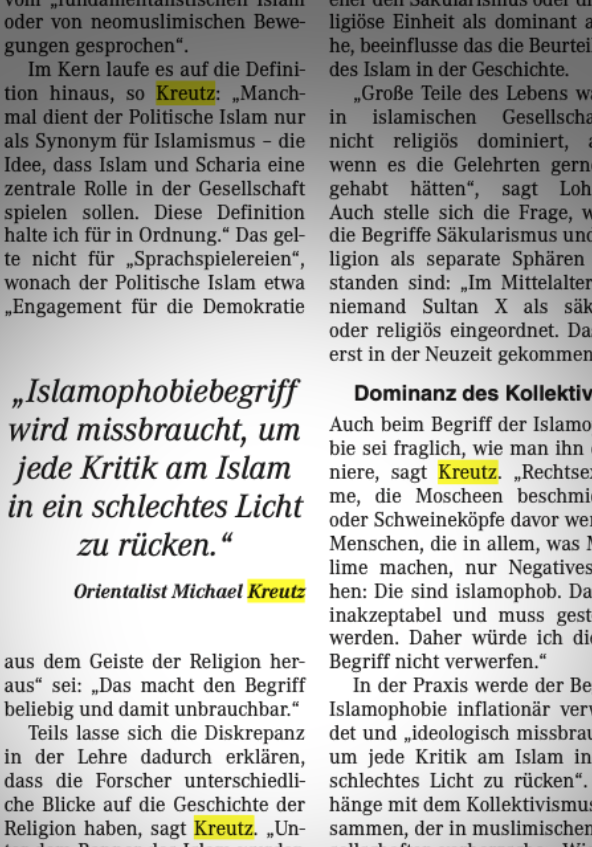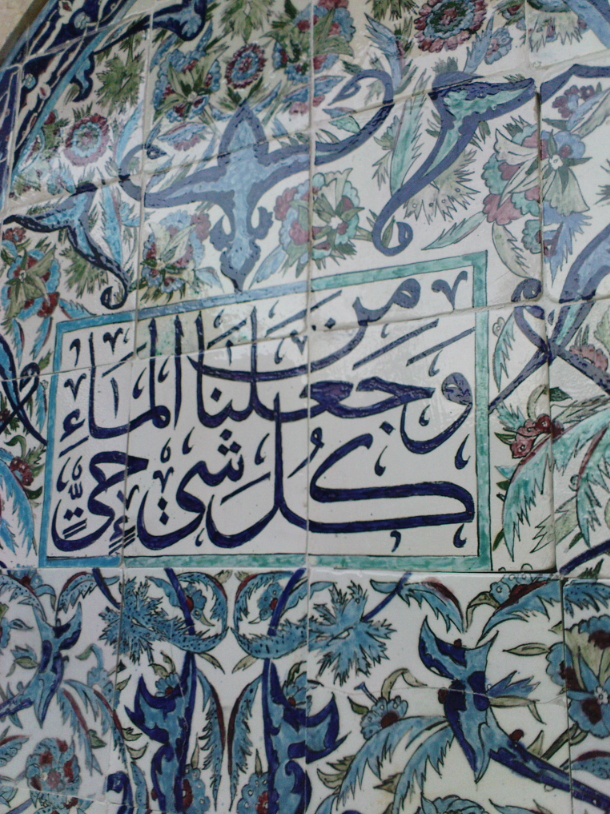Die “Wiener Zeitung” hat einen längeren Artikel zum Thema “politischer Islam” gebracht und ihn mit einigen Statements von mir garniert.

Den Artikel unter dem Titel “Wie viel Politik im Islam steckt” gibt es auch online hier.

Die “Wiener Zeitung” hat einen längeren Artikel zum Thema “politischer Islam” gebracht und ihn mit einigen Statements von mir garniert.

Den Artikel unter dem Titel “Wie viel Politik im Islam steckt” gibt es auch online hier.
In der öffentlichen Debatte über den Islam hierzulande ist immer wieder zu hören, dass die Scharia komplex und flexibel sei und im Familienrecht auch fortschrittlich interpretiert werden könne, womit sie nicht im Gegensatz zu unserer Rechtsordnung stünde.
Jan Assmann, Heidelberger Ägyptologe und in der zweiten Phase seines publizistischen Schaffens Kulturwissenschaftler, ist u.a. für seine These von der (wie er sie nennt) “Mosaischen Unterscheidung” bekanntgeworden, die freilich viel Kritik auf sich gezogen hat und über die ich in meinem Buch Zwischen Religion und Politik (S. 60) schrieb:
… derzufolge die „Mosaische Unterscheidung‟ zwischen wahrer und falscher Religion einen eigenen Typ von Wahrheit begründet. Mag Guy Stroumsa dieser These auch Plausibilität zubilligen, so bleibt der Vorwurf bestehen, dass sie den Monotheismus insgesamt in Misskredit bringt. Assmann weist diesen Vorwurf zurück, da er in der genannten Unterscheidung eine Errungenschaft und keinen Rückschrittt sieht. Überdies bedeute eine solche Unterscheidung für das Judentum ohnehin nicht mehr als eine „Selbstausgrenzung‟ (Assmann) gegenüber seiner Umwelt, was an sich noch keine Gewalt zeitige.
Assmann geht in der Verteidigung seiner These schliesslich so weit zu behaupten, dass die „Mosaische Unterscheidung‟ Toleranz überhaupt erst möglich gemacht habe, insofern als diese nur gegenüber etwas gewährt werden könne, was der eigenen Auffassung widerspricht. Der antike Polytheismus hingegen habe keine Toleranz praktizieren können, weil die eigenen Götter gar nicht im Konflikt mit anderen Göttern gestanden haben. Das ist ein wenig um die Ecke gedacht, denn genausogut könnte man im Mangel an Konflikt einen Ausdruck von Toleranz sehen. Im Grunde aber befindet sich Assmann hier in guter Gesellschaft mit John Selden (1584-1654), der lange zuvor die Ansicht vertrat, dass nach rabbinischer Auffassung für Nichtjuden gar keine Veranlassung besteht, das mosaische Gesetz zu befolgen, folglich Gewalt um der Bekehrung willen keinen Anreiz im Judentum findet.
Ich bin jetzt erst dazu gekommen, Assmann Buch Exodus zu lesen, das ein Jahr zuvor erschienen ist. Dort schreibt Assmann ganz richtig, dass besagte These schon älter ist und führt sie auf David Hume (1711-1776) zurück, was uns hier aber nicht weiter interessieren soll.
Die Pointe liegt in Assmanns verschmitzter Endnote. Dort schreibt er mit Bezug auf die “Mosaische Unterscheidung”:
“Seltsamerweise wird sie in unserer geschichtsvergessenen Gegenwart als die umstrittene These eines Heidelberger Ägyptologen diskutiert.”
Herzig.
Ein Historiker beklagt sich im “National Interest” über die einseitigen Wahrnehmungen des Islam im Weissen Haus. Während die Trump-Regierung ein generelles Misstrauen gegenüber dem Islam hegt, habe Obama das krasse Gegenteil geglaubt:
In 2011, for example, Tibi’s very important Islamism and Islam was published by Yale University Press, but it received scant attention in the general-interest reviews, in public discussion, or within the Obama administration. Yet whether Obama knew better or whether he was so much a product of the politically correct academy that he actually thought that the Islamic State had nothing to do with Islam …
Der Autor, Jeffrey Herf, bezieht sich in seinem Artikel mehrfach zustimmend auf Bassam Tibis “Islamism and Islam”, das von der amerikanischen Öffentlichkeit zu wenig wahrgenommen worden sei. Da mag er recht haben. Allerdings scheint er selbst das Buch nicht gelesen zu haben. Tibi selbst sagt nämlich explizit, dass Islamismus nicht Islam sei, so der Titel eines seiner Kapitel („Why Islamism is not Islam‟)! Darin heisst es:
In the case of Islamism, the religionization of politics means the promotion of a political order that is believed to emanate from the will of Allah and is not based on popular sovereignty. Islam itself does not do this. As a faith, cult, and ethical framework, it implies certain political values but does not presuppose a particular order of government.
Ähnlich hat er auch in anderen seiner Bücher argumentiert (z.B. in “Islam’s Predicament”). Ob man dem zustimmt oder nicht – Obama lag hier ganz auf einer Linie mit Tibi.
Eine Anmerkung zur “Ambiguitätstoleranz”, dem neuen Modewort in den deutschsprachigen Islamwissenschaften:
„To be sure, Islamic law was not enforced everywhere, every time; as in many other legal system, expediency, necessity, favoritism, bribery, inefficiency, politics, and other factors could alter an outcome. But the plain fact is that Islamic law in medieval Spain imposed humiliating conditions on Christian dhimmis to ensure that absolute power remained in the proper hands.‟[note]Darío Fernández-Morera: The Myth of the Andalusian Paradise. Muslims, Christians, and Jews under Islamic Rule in Medieval Spain. Wilmington/ Delaware 2016, S. 209.[/note]
Das hat über Jahrhunderte funktioniert.
Time and again I happen to come across a book which is not only timely and well-written but a real gem of erudition and virtuosity. Such a book is “Ancient Religions, Modern Politics,” written by Princeton’s Michael Cook. It certainly is a work of major importance for everyone who wants to understand why the Islamic world suffers from an incessant instability and repression.
Cook aspires to examine the political dimension of Islam and he sets the bars very high when he does so in comparison with Christianity in general, Latin American Catholicism in particular, and finally with Hinduism. And he comes out with surprising findings without falling into the trap of essentialism.
Islam, says Cook, has a clear concept of territoriality (the concept of dār al-Islām) but doesn’t focus on specific borderlines. (69) That leaves room for a number of political concepts including those of expansion. Western intellectuals may not want to hear this but according to Cook there is no doubt: “The historical salience of warfare against unbelievers in the career of the founder was thus written into the foundational texts.” (221) No less than 65 military campaigns were led by Muḥammad himself which in itself may be telling. (390)
Of course, heritage is no mechanism that compels people to carry out specific actions. But we would jump to conclusions if we absolved it from any influence on behavior: “[…] no heritage is a reliable predictor of the behavior of those who inherit it, but just as surely heritages are not interchangeable.” (248) Which is to say that people do resort to resources of their own heritage if they seek to justify certain activities and when these resources allow violence there will always be people to make use of it.
Contrary to popular wisdom that all religions have the same share of resources which justify violence, Cook demonstrates that this is a myth. Although there are cases of violence in the name of Hinduism they run counter to Hinduism’s own law of non-violence. Therefore, killing non-Hindus is not compliant with its tradition in whatever interpretation or school of thought. Today, Hindus can accuse Islam of intolerance without having to accept a likewise accusation. (234, 239)
Another of Islam’s predicaments is the law. Since sharia is based on the conviction that it is made by God and superior to any form of human law (277) Islamic jurists were always very inventive in their interpretations but never dared to add new principles into the legislative corpus. In best case, there was some coexistence with human rulings. But any step beyond was inhibited for lack of authority. (278-9)
This explains the Ottoman caveats against humans laws (274-5) and also customary law has always been a competitor of the sharia. (276) If you think that this is the case in all systems of faith, think again. It surely is in contrast to the Christian culture where “Christianity did not aspire to monopolize the domain of law in the way that Islam did.” (300) Hence, law can be for Christians a banal objective but not for Islam. (304)
Islam also differs from other religions by the fact that “Christians have no law to restore, while Hindus do have one but show little interest in restoring it. It is only in the Islamic case that there is both the will and the way.” (308) So, how about founding democracy on the basis of Islam? Following Cook, this is not out of imagination but rather a risky venture since “[l]iberty in the sense of political freedom is not a value enshrined in the Islamic religious tradition […]. Egalitarianism bulks much larger in the Islamic tradition.” (321, cf. 334)
Although egalitarianism is a keyword of early Islam, it did not include women, slaves and infidels “which does not play well in today’s world.” (390) In a moody style Cook concludes that „alongside the edifying activitis of al-Qāʿida, the Ṭālibān, the Chechens, and the Palestinians, we have to endure nitwits who shoot up a congregation in a mosque in the Sudan, or blow up a Shīʿite mosque in a Pakistani village […].“ (365)
Which leads us to the next point: In stark contrast to Islam, Hinduism has little to offer which could be called fundamentalism. (413) Even for the Hindu nationalists “fundamentalism would be an inept strategy.” (428) More than that, “[d]espite the occasional appearance of the term ‘Hindu fundamentalism,’ there is no such thing in India today.” (429)
Hindu nationalists can pray to “Mother India” albeit a goddess not even rooted in Hinduism and a modern invention while the Islamists are inhibited from such a step that would be regarded as bidʿa, an illegitimate innovation. Only the Sufis and the Imamite Shia are able to keep with the Hindus in this aspect but both are far away from constituting some sort of mainstream. (426-7) What is much more prevalent in the Islamic World is “[t]he politics of Islamic social values” which next to nothing parallels in the non-Muslim world. (446)
These social values may be behind a tendency which is at odds with Western concepts of pluralism. As a matter of fact, “[…] polls in several Muslim countries show majorities supporting the idea of a caliphal restoration or at least of uniting all Muslim countries into a single Islamic state.” (326) Although fundamentalism is not the necessary outcome of being a devout Muslim Cook is convinced that “the overlap between fundamentalism and modernism is greatest in the Islamic case.” Even worse, “this affinity is reinforced by another overlap, that between fundamentalism and conservatism. Here, too, a tendency to fundamentalism works best in the Islamic context.” (441)
The foremost target of this thinking is the Jewish state: “The Jews were intimate enemies at the beginning of Islam […].” Today they are enemies again, in between they were no more than a harmless diaspora community: “Here fundamentalism helps to close the gap.” (387-8) Other faiths lack this kind of militant fundamentalism with the possible exception of Sikhism but “[b]oth militant Sikhism and Hindu nationalism took shape in the shadow of Islam, and both were clearly in the business of emulating Muslims.” (446-7)
How bleak, then, are Islam’s prospects? Southeast Asia and East Asia have clinged to conservatism for a long period of time before they gave up on it in favour of modernism. While some decades ago “the Muslim world did not seem to diverge very much from the rest of the non-Western world” it now has become “sufficienly salient among a variety of Muslim populations across the globe” that it is the Muslim World which constitutes “a large and conspicuous exception to the normal pattern.” Cook connects this to the “character of the Islamic heritage.” (440-1)
Since these statements run contrary to the dogmas of the Saidian school (“Islam explains nothing”) which is so dominant in Western departments of Middle Eastern Studies they will not remain undisputed (rather be ignored). In any case, the book is an important contribution to the discussion of the future of Islam in a modernizing world.
Michael Cook: Ancient Religions, Modern Politics. The Islamic Case in Comparative Perspective. Princeton: Princeton University Press, 2014. 541 pages, € 27,11.
Dass Ablasshandel für den mittelalterlichen Christen etwas durchaus vernünftiges war, jedenfalls angenehmer als eine ewige Furcht vor dem Zorn Gottes, wie Luther sie predigte, behauptet Alan Posener in der “Welt”, für den es deshalb auch keinen Grund gibt, das 500-jährige Jubiläum der Lutherschen Angriffe auf den Ablasshandel zu feiern, zumal darin auch nur Luthers Feindschaft gegenüber dem Handel im allgemeinen zum Ausdruck komme.
Schöner, weil mit ironischen Unterton, hat es allerdings Heinrich Heine ausgedrückt, als er den Katholizismus als eine Art von Konkordat beschrieb, und zwar eines zwischen Gott und dem Teufel. Der Ablasshandel war für Heine ein “kluges System von Zugeständnissen”, von der Kirche “zum Besten der Sinnlichkeit” ins Leben gerufen, um menschliche Triebe mit den Vorgaben der Religion zu versöhnen: “Du darfst den zärtlichen Neigungen des Herzens Gehör geben und ein schönes Mädchen umarmen, aber du musst eingestehn, dass es eine schändliche Sünde war, und für diese Sünde musst du Abbusse tun.‟ Das ganze Wesen des Katholizismus in einem Satz!
Menschliche Bedürfnisse auszuleben, ohne seinen Glauben verraten zu müssen – das hatte erst der Ablasshandel möglich gemacht. Dessen Systemcharakter hatte Luther unterschätzt. Der Ablasshandel, so Heine, war eben kein Missbrauch, sondern die zwingende Folge des ganzen Kirchensystems, das selbst natürlich auch davon profitierte. Heine konnte es sich nicht verkneifen darauf hinzuweisen, dass der aus aus den Geldern finanzierte Petersdom so etwas wie ein “Monument sinnlicher Lust” wurde, indem es die Sünde war, die das Gebäude finanzierte. (Ähnlich hat übrigens Umberto Eco das katholische Weltbild auf den Punkt gebracht, als er einmal schrieb, dass eine typisch katholische Einstellung folgendermassen charakterisiert sei: “Man weiss sehr wohl, was das Gute ist, man spricht davon und empfiehlt es; und zugleich akzeptiert man, dass das Leben anders ist, und hofft, Gott werde schliesslich vergeben.”)
Heine hatte aber nicht übersehen, dass derselbe Luther wohl auch entscheidend dazu beigetragen hatte, einer nicht zu unterschätzenden weltlichen Institution zum Durchbruch zu verhelfen: der Gedankenfreiheit. Indem Luther darauf pochte, dass seine Lehre nur durch die Bibel oder die Vernunft zu widerlegen sei, hatte er die einzigen Autoritäten benannt, die er als Richter in religiösen Angelegenheiten akzeptierte. Dadurch erst, so Heine in seiner Abhandlung “Zur Geschichte der Religion und Philosophie in Deutschland” (1834/35), sei in Deutschland die Gedankenfreiheit möglich geworden, die auch die Philosophie beflügelt habe. Gerade in Preussen sei die Gedankenfreiheit grenzenlos gewesen.
Dass es möglicherweise wiederum Luthers Lehre war, die, wie Helmuth Plessner mehr als einhundert Jahre später urteilen sollte, eine Verwurzelung der Aufklärung in Deutschland verhindert hat, seitdem es mit Preussen gegen den Kaiser in Wien gross geworden war, ist eine andere Geschichte.
(Geringfügig sprachlich überarbeitet 24.7.2013.)
—
(Bild: Michael Kreutz, Lutherstadt Wittenberg, 2010)
Nachtrag 25.7.2013
Das Zitat von Umberto Eco stammt aus dem Buch Kunst und Schönheit im Mittelalter (München und Wien 1991), 188-9.
Der Kommunikationswissenschaftler Kai Hafez von der Universität Erfurt widmet sich in seinem Buch „Freiheit, Gleichheit und Intoleranz“ (2013) u.a der Frage, wo die Trennlinie zwischen der berechtigen Kritik am Islam und der sog. Islamophobie verläuft:
„Die Antwort lautet, dass man ebenso wenig wie man das Judentum für die Handlungen Israels verantwortlich machen kann, den Islam als Erklärung für die Aktivitäten von Terroristen usw. heranziehen sollte.“ (S. 217)
Womit er die Existenz eines völkerrechtlichen anerkannten Staates und Terroranschläge von Islamisten für vergleichbare Phänomene erklärt.

Seit mindestens achthundert Jahren, seit Averroes nämlich, versuchen islamische Intellektuelle, das traditionelle Denken ihrer Zeit für neue Gedanken zu öffnen. Noch jedesmal sind sie gescheitert und daran sind sie selbst nicht ganz unschuldig. Denn die Autorität der Religion über alles, was die Gesellschaft betrifft, haben sie so gut wie nie hinterfragt. Averroes wollte Philosophie und Logik aus dem Koran heraus legitimieren, am Ende geriet er unter erheblichen Rechtfertigungsdruck durch die Almohaden-Herrscher.
Powered by WordPress & Theme by Anders Norén